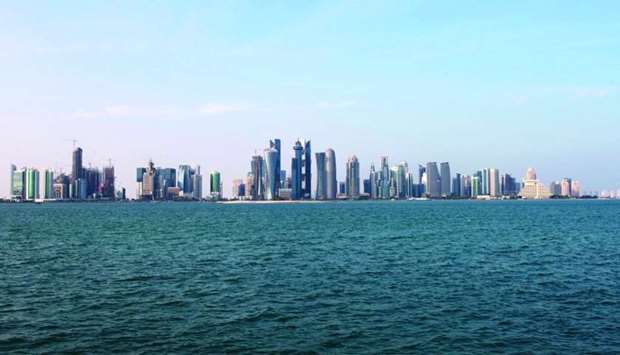Qatar’s GDP has been estimated to reach $237bn by 2024 from $199bn this year, a new report has shown.
GDP per capita, FocusEconomics said, has been estimated to reach $85,160 from $71,975 this year.
Qatar’s economic growth in terms of nominal GDP will reach 5.1% in 2024 from 3.6% by the year-end.
Qatar’s public debt as a percentage of the country’s gross domestic product (GDP) will fall continuously over the next five years, from 51.4% this year to 46.2% in 2024, researcher FocusEconomics said in its latest country report.
The country’s public debt is estimated to fall to 50.6% (in 2021), 49.4% (in 2022) and 47.8% (in 2023).
The country’s fiscal balance as a percentage of GDP is set to rise to 4.5% in 2024 from an estimated 1.3% this year.
Qatar’s merchandise trade balance will scale up further and exceed $60.3bn in 2024, the report said.
This year, FocusEconomics has projected the merchandise trade balance at nearly $40.6bn. Next year, it will account for $41.6bn, $46.1bn (2022) and $52.2bn in (2023).
The current account balance (as a percentage of GDP) will be 5.2% in 2024 compared with 4% in 2020.
International reserves may exceed $37.5bn in 2024, from $39.5bn this year; FocusEconomics estimated it will cover 10.6 months of country’s imports by then.
The country’s inflation, the report noted, will be 2% in 2024 and -1.3% this year.
Qatar’s unemployment rate (as a percentage of active population) will remain a meagre 0.2% in 2024, unchanged from this year.
According to FocusEconomics, the economy likely picked up in the second half of last year.
Industrial output strengthened in the third quarter, while the non-oil sector PMI recovered in the fourth quarter.
Moreover, year-on-year credit and visitor arrivals growth was strong in October–November, boding well for private consumption, FocusEconomics noted.
That said, merchandise exports remained depressed up to November, partly due to lower energy exports. This follows Q2’s contraction in economic output as a dip in the non-mining and quarrying sector weighed on the headline figure.
The government announced in December that the 2020 budget will amount to roughly $58bn, a 1.9% increase from 2019, with major spending pencilled in for World Cup 2022 preparations.
“Economic activity is expected to pick up notable steam this year as the Barzan gas facility comes online and investment in the expansion of the North Field gas project intensifies. Heightened geopolitical tensions and volatile commodity prices remain downside risks to the outlook, however,” the report noted.
FocusEconomics panellists see growth of 2.2% in 2020 and 2.5% in 2021.
Consumer prices in Qatar fell 0.7% in annual terms in November, softer than October’s 0.8% decline.
“Inflation should return this year on a more favourable base effect, some likely recovery in the housing market and an expected pick-up in economic activity. Our panellists expect average consumer prices to increase 1.3% in 2020, which is down 0.6 percentage points from last month’s forecast. In 2021, our panel sees inflation averaging 1.4%,” FocusEconomics said.


